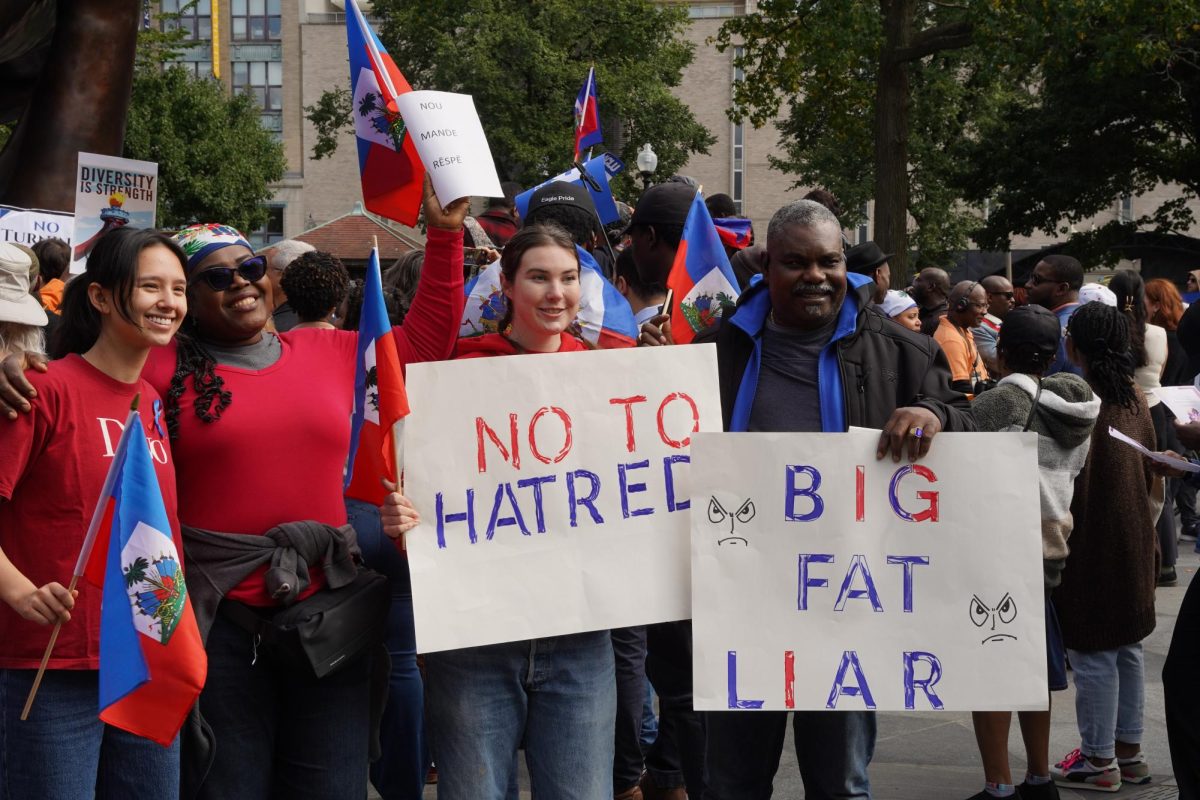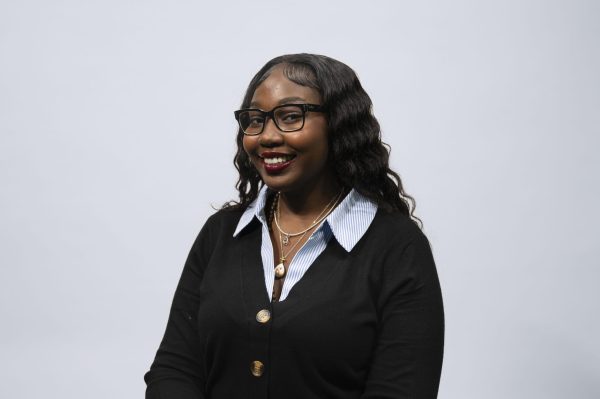The Massachusetts Immigrant & Refugee Advocacy, or MIRA, Coalition hosted a rally in Boston Common at noon Sept. 24 in solidarity with the Haitian immigrants of Springfield, Ohio, who have faced a flood of hate and threats over the last several weeks due to unsubstantiated claims made by former President Donald Trump.
The rally hosted several speakers, including the Executive Director of the Immigrant Family Services Institute Dr. Geralde Gabeau, Executive Director of MIRA Elizabeth Sweet and Boston City Council President Ruthzee Louijeune, among others.
The rise in hate against Haitian immigrants nationwide is a direct result of recent politically-motivated, defamatory speech by several high-profile politicians like former President Donald Trump. The false statements claimed that Haitian immigrants in Springfield were stealing and eating pets as well as posing a danger to other residents. The inflammatory remarks have resulted in countless threats against Haitian immigrants not only residing in Springfield but across the country.
The rally was held at The Embrace, a monument in Boston Common representing civil rights activist Martin Luther King Jr. and his wife, Coretta Scott King, embracing. Speakers said the location of the rally was intentional.
“It is not a coincidence that we are standing here today in front of this monument,” said Heather Yountz, senior immigration staff attorney at the Massachusetts Law Reform Institute. “Martin Luther King Jr. knew about standing up to cruelty, to hatred, to race-based violence, but he never surrendered his dignity, and neither should you.”
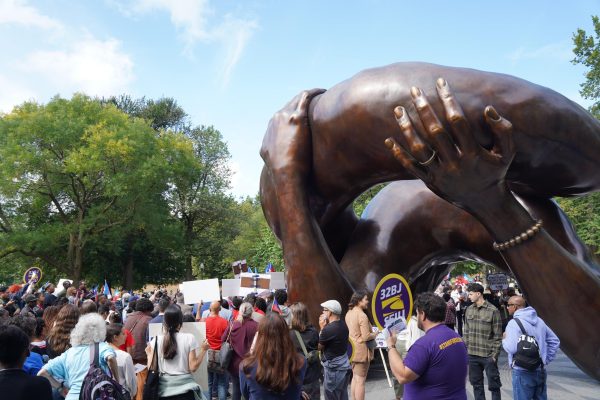
The objectives of the rally were listed in an event announcement on the MIRA Coalition website: to end the defamation, protect human dignity, recognize the contributions of Haitian immigrants and stand against hate.
The rally’s resolute speakers discussed the triumphs of the Haitian community and the positive impacts Haitians have had on the United States, dating back to the 18th century. They also denounced the false, hateful assertions directed at them, propagated by individuals with politically-motivated agendas.
“I cannot believe it is someone who used to occupy the highest seat in the [country] who is spreading these vicious, xenophobic, racist lies,” Louijeune said.
During the rally, speakers emphasized the power of love and unity to combat hate.
“Love is the greatest weapon that we can have against hatred,” Gabeau said amongst cheers and applause. “We are people of love. We believe in solidarity, we believe in unity and we believe that together we can accomplish more.”
Despite the fact that the Haitian community has received an outpouring of threats and discrimination, each speaker stressed the importance of not fighting hate with hate.
“We know that anti-Blackness is something that exists in our country and that xenophobia exists,” Louijeune said. “We know that they always come for the immigrants first, and we need to make sure we are here standing in solidarity.”
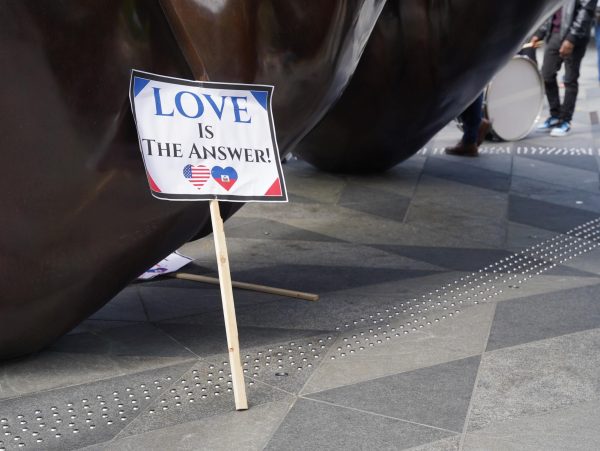
The Haitian American community is tight-knit, rallying with each other across the country.
“So many people are here to stand with us because when they come for one of us, they come for all of us,” Louijeune said as the crowd chanted with her.
Kedel Etienne, a Haitian immigrant and rally attendee, said he did not expect to see the Haitian community targeted in the presidential race.
“The Haitian community feels that we are under attack by politicians,” Etienne said. “That is why we are here today — because we cannot take it anymore.”
The majority of Haitian immigrants enter America legally, many with the status of humanitarian parole, Yountz said. According to the United States Census Bureau’s Current Population Survey, 68.7% of foreign-born Haitians were naturalized U.S. citizens in February 2024. For many Haitian immigrants, their move to the United States came out of necessity to escape persecution, gang violence and poverty.
“We don’t feel safe. We feel as if our image is being tarnished,” Etienne said.
Some Haitians fear the reputational damage resulting from recent hate may linger for years to come.
“We don’t know how this comes about, why we are being accused of stealing dogs, cats and eating them. Haitians, we are civilized people,” Etienne said. “We fought for our humanity. Our ancestors fought to be recognized as humans.”
Haiti was the first free Black republic in the world. The country itself stands as a symbol of resilience in the face of adversity. Many Haitians are proud of their ancestry and proud to be from a country that champions Black rights. However, they are also proud to be American and strive to make the country a better place, Entienne said.
“All we want to do here is work hard, contribute to society, raise our children and take the opportunities that we did not get back home,” Etienne said. “The hate needs to stop so we can continue to build this country.”
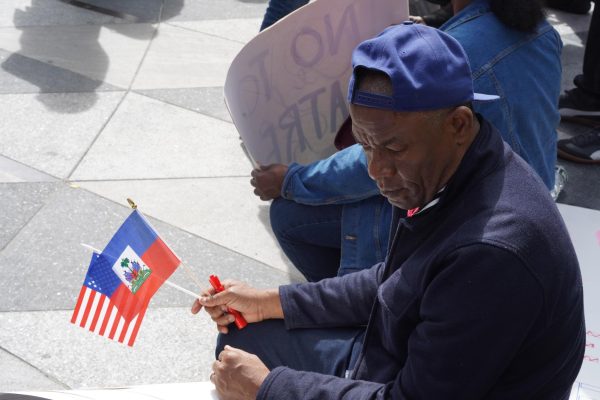
The Huntington News is dedicated to serving the Northeastern University community with original, professional reporting and creating an environment in which student journalists can learn from one another. Support an independent, free press at Northeastern University with your donation today.



